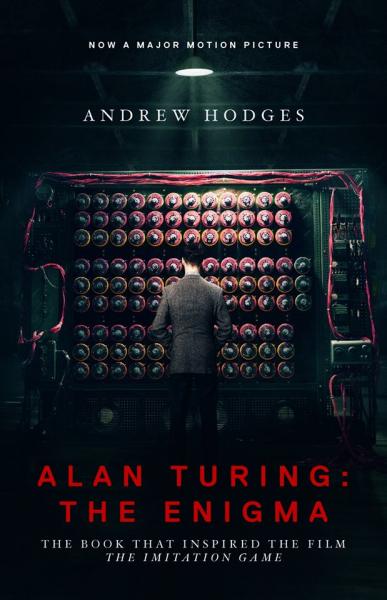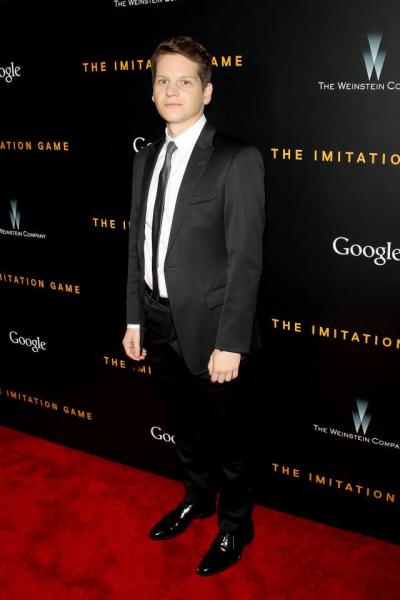Cracking the Code of Scripter Winner Graham Moore's Success

This marked Moore’s first major win for his adapted screenplay this awards season, apart from being honored with the entire "Imitation Game" team at the AFI Awards. He has also received nominations for Best Adapted Screenplay for a WGA, a BAFTA, and an Academy Award, all of which have yet to be announced.
"The Imitation Game" appears to be the frontrunner for the Best Adapted Screenplay Oscar, with Harvey Weinstein throwing his Oscar campaigning efforts behind the film most strongly in that category. Its assumed frontrunner status could be bolstered by its Scripter win, though it faces serious competition from "Whiplash" (confusingly placed in the "Adapted Screenplay" category due to a short previously made to promote the financing of the feature) and "American Sniper," which has been steadily gaining traction across the board.
Screenwriter Graham Moore was born in Chicago, studied religious history at Columbia University in New York and relocated to Los Angeles about five years ago. He began his career as a sound engineer, mixing sound in a studio for bands as well as at live gigs, all the while writing on the side. When he first moved to LA, his focus was on comedy and sitcom writing, and one of his first Hollywood jobs was writing for the TV series adaptation of "10 Things I Hate About You." However, when his debut novel hit the New York Times bestseller list, it was evident that Moore's strengths were in historical storytelling.
When Moore first began pursuing "The Imitation Game" in summer 2010, despite having never written a feature film, he was a natural fit for the story. He had just published his debut novel "The Sherlockian," a novel about Sir Arthur Conan Doyle that displays Moore’s talents for writing with an eye to research and history. Ironically, this novel that developed his knack for historical storytelling shares a subject matter with the show that made the star of "The Imitation Game," Benedict Cumberbatch, an international sensation.

Once Moore’s screenplay was complete, it landed on top of the 2011 Black List of the best unproduced scripts in Hollywood, and producers began working to assemble financing.
Moore's debut novel and screenplay share many parallels beyond Cumberbatch's coincidental link. While both texts require the writer delve deeply into research and historical fact, they also share a structure and a fascination with puzzles and cryptography. Both "The Sherlockian" and "The Imitation Game" feature cross-cutting between time periods to create a sense of mystery and suspense, as well as allowing historical moments in disparate time periods of a character's life to comment on each other. Plus, both Turing and Sherlock Holmes share a penchant for cracking unbreakable codes and solving seemingly impossible problems.
Conan Doyle was a proponent of fighting injustice and was responsible for the exoneration of two wrongly convicted men in his lifetime. It's fitting then that Moore's first screenplay would follow on the heels of a novel about Sir Arthur Conan Doyle, as the film seeks to highlight and combat injustice in its storytelling.
Andrew Hodges, who wrote the book "Alan Turing: The Enigma" on which the film is based is a mathematics professor at Oxford University’s Wadham College. He was unable to attend the USC Libraries Scripter Award, so Scripter Selection Committee Chair Howard Rodman accepted on his behalf.
Moore, however, was in attendance and visibly excited as he took the stage to accept the 27th Scripter Award. He spoke eloquently about Alan Turing and his desire to carry on the legacy of a man long silenced by history: “Alan Turing never got to stand on a stage and hear people applaud his name. And I do right now, and that is a profound injustice. All that I can do is spend the rest of my life endeavoring to repair it.”
Speaking with me after the ceremony, Moore explained that a lifelong fascination with Turing had prompted him to adapt Hodges’ biography into a film. “I’ve been obsessed with his story since I was a teenager," said Moore. "I was a big computer nerd growing up, so I was lucky enough to be exposed to his story early, and it always seemed like such a profound and important story that not enough people knew. And Alan’s story had been told so beautifully on the page and on the stage but never on film, and it always seemed to me if anyone’s life deserved a feature film, it was Alan Turing’s.”

Throughout the evening, Moore made it clear how happy he was to be a finalist and what a warm welcome he felt he’d received from the USC Libraries. “It’s such a tremendous honor because it’s voted on by other writers, and some pretty amazing other writers. Writers I’ve been reading since I was old enough to read," he said.
In the weeks to come, Moore has the chance to add a WGA award, BAFTA, and Oscar to his shelf alongside the Scripter award, but he is thrilled by the implications of his Scripter victory: ”The support of my peers means more to me than anything, especially for a story like this, which is so near to my heart,” he said.
With the success of "The Imitation Game," Moore moves next to several high-profile projects, including an HBO pilot with Director Michael Mann and another historical adaptation with "The Devil in the White City." He also is in the midst of completing his second novel, another work of historical fiction set in 1880s New York.
Contact Staff Reporter Maureen Lenker here or follow her on Twitter.



